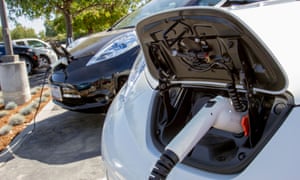https://www.theguardian.com/business/2017/jul/07/uk-fund-research-electric-cars-return-power-grid
The UK plans to invest millions of pounds to explore how the batteries in thousands of electric cars could help the power grid and drive take-up of the cleaner vehicles.
British businesses will be able to bid for £20m of government funding for undertaking research and trials of vehicle-to-grid technology, which officials believe holds “enormous potential” benefits for drivers and the energy system.
The announcement comes on the heels of a week of good news for electric car manufacturers and battery-makers.
Volvo said it was turning its back on cars powered solely by an internal combustion engine, France declared it would ban sales of diesel and petrol cars by 2040 and Tesla revealed plans to build the world’s largest battery storage plant in South Australia.
There are now more than 90,000 electric or plug-in hybrid cars on UK roads, which currently only draw electricity from the grid when owners recharge them overnight at home or for half an hour at rapid charging stations in towns, cities and motorway service stations.
But with vehicle-to-grid, their batteries could also provide services to local power networks and National Grid – returning electricity to the grid at times of peak demand, or filling the gap if the output from windfarms or solar panels were suddenly less than expected.
Drivers also stand to benefit as they would be compensated in some form – such as via payments or free parking – for allowing their batteries to help power grid managers.
StrategicFit, an energy consultancy, thinks a single electric car could earn its owner £1,000-£2,000 a year for helping the grid, depending on where it were located and how often it were plugged in.
Jesse Norman, a transport minister, said: “Electric vehicles are already helping thousands of motorists cut their fuel costs, and now there is an extra financial incentive for motorists to go green.”
The Japanese car-maker Nissan and Italian energy company Enel last year launched the UK’s first large-scale trial of the technology, involving 100 electric cars, and there are several smaller pilot projects being run by universities.
The £20m fund will support such work, by paying for feasibility studies into how the technology could be used in the future, development of charging equipment and trials around the country. The competitions are expected to attract energy companies, car makers and local authorities.
Adam Mitchell, the principal at StrategicFit, said: “There are many companies who expect [the technology] to grow quite significantly. They are starting to test commercial feasibility but it’s fairly early days.”
The government wants the projects to address how consumers grapple with the technology, examine cybersecurity issues and demonstrate the technical and commercial potential for supporting power networks.
Officials believe that giving new financial incentives to electric car owners – on top of the cheaper running costs and exemptions to congestion zones they already enjoy – will drive a “significant take-up” of the vehicles in the next five to 10 years.
Since you’re here …
… we have a small favour to ask. More people are reading the Guardian than ever but advertising revenues across the media are falling fast. And unlike many news organisations, we haven’t put up a paywall – we want to keep our journalism as open as we can. So you can see why we need to ask for your help. The Guardian’s independent, investigative journalism takes a lot of time, money and hard work to produce. But we do it because we believe our perspective matters – because it might well be your perspective, too.
High quality journalism is essential intellectual nourishment. The generosity of providing such a service without a paywall deserves recognition and supportGiacomo P, Italy
I’ve been enjoying the Guardian’s top-quality journalism for several years now. Today, when so much seems to be going wrong in the world, the Guardian is working hard to confront and challenge those in power. I want to support thatRobb H, Canada
I appreciate there not being a paywall: it is more democratic for the media to be available for all and not a commodity to be purchased by a few. I’m happy to make a contribution so others with less means still have access to information.Thomasine F-R, Sweden
If everyone who reads our reporting, who likes it, helps to support it, our future would be much more secure.

沒有留言:
張貼留言